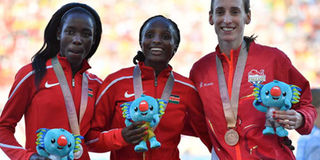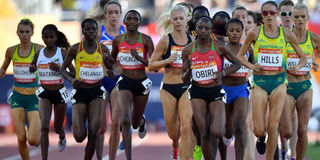Hellen Obiri: How I shed 23kg after childbirth to run again

Kenya’s Hellen Obiri (centre, gold), Kenya’s Margaret Chelimo Kipkemboi (left, silver) and England’s Laura Weightman (bronze) pose with their medals after the athletics women's 5000m final during the 2018 Gold Coast Commonwealth Games at the Carrara Stadium on the Gold Coast on April 14, 2018. PHOTO | SAEED KHAN |
What you need to know:
- Telephone call from daughter thousands of kilometres back home on the eve of competition inspires athlete to win gold in tough 5,000m race in Gold Coast and with the victory, a dream of an Olympics title is born.
- After giving birth to lovely daughter through Caesarean Section, World 5,000 metres queen returns from maternity leave to training after just seven months. Through sheer hard work and determination, she sheds 23kg and goes on to add the Commonwealth Games honours to her world title in Australia.
On the eve of Saturday’s Commonwealth Games 5,000 metres final, Kenya’s world champion Hellen Obiri received a telephone call from Nairobi.
It was a special call.
On the line was Tania “Blessing” Mocheche, Obiri’s daughter who turns three next month.
“She asked me, ‘mummy, where is the gold medal?’
“I told her it would be in my suitcase, and I was going to bring it home.”

Kenya’s Hellen Obiri (gold) poses with her medal after the athletics women's 5000m final during the 2018 Gold Coast Commonwealth Games at the Carrara Stadium on the Gold Coast on April 14, 2018. PHOTO | SAEED KHAN | AFP

Kenya’s Hellen Obiri (centre, gold), Kenya’s Margaret Chelimo Kipkemboi (left, silver) and England’s Laura Weightman (bronze) pose with their medals after the athletics women's 5000m final during the 2018 Gold Coast Commonwealth Games at the Carrara Stadium on the Gold Coast on April 14, 2018. PHOTO | SAEED KHAN |
That call increased the pressure on the Kenya Defence Forces athlete to add the Commonwealth Games gold to the World Championships one she won in London last August when she outpaced and upset pre-race favourite Almaz Ayana of Ethiopia at the Olympic Stadium.
And indeed she controlled most of the race on Saturday, crossing the 1,000-mark mark in 3 minutes, 22.3 seconds with teammates Margaret Chelimo and Eva Cherono in close contact.
“We had planned to go through the first 2,000 metres first and then see how race pace would be.
“Then we agreed to keep changing the lead and commanding the pace as a team, just like our men’s team did in the steeplechase,” she explained yesterday’s race tactics.
“After 1km, I told Chelimo the pace was slow because we crossed 400 metres in 76-77 seconds so I went ahead for two laps and then asked Chelimo to go ahead.
“I saw the young Cherono was struggling because this was her first major race and that’s when I decided to go for it with Chelimo,” the 28-year-old from Nyangusu, Kisii County, explains in between congratulatory hugs and high fives at the Carrara Stadium’s mixed zone where athletes interact with media post-competition.

Kenya’s Hellen Obiri and Australia’s Madeline Hills compete in the athletics women's 5000m final during the 2018 Gold Coast Commonwealth Games at the Carrara Stadium on the Gold Coast on April 14, 2018. PHOTO | SAEED KHAN | AFP

Kenya’s Margaret Chelimo Kipkemboi (left) celebrates with Kenya’s Hellen Obiri after the athletics women's 5000m final during the 2018 Gold Coast Commonwealth Games at the Carrara Stadium on the Gold Coast on April 14, 2018. PHOTO | SAEED KHAN | AFP
“I would like to dedicate my gold to my young, beautiful baby, Princess, because when I return home from competitions, she often tells me ‘mummy, you have tried so hard’
“And her telephone call last night increased my resolve to work harder for this gold,” she says.
Interestingly, after giving birth to “Blessing”, Obiri added more than 20 kilogrammes, by all standards a huge increase for an elite athlete.
“It was not an easy time for me,” Obiri, who was inspired to take up running by Sydney Olympics 1,500m gold medallist Noah Ng’eny, reflects.
“Especially because I had a Caesarian Section delivery, and I took like seven months before doing any training,” said Obiri, who won silver at the 2016 Olympic Games in Rio de Janeiro.
“But I started slowly and fortunately my body responded well to training and I would not imagine that I could resume training so soon, because, in total, I lost only nine months and this motivated me to gradually continue with my comeback.”
LOSE 22 KGS
Not an easy task, considering she had to lose 22kgs to get back into competitive shape.
“I added 22kgs but I managed to lose 23 at the time.
“Right now I’m 49kgs, and just imagine I’d gone up to 72kgs.”
Obiri, whose husband Tom Nyaundi is an avid track and field fan and former runner, might as well consider giving tips to new mother Mercy Cherono who, like her, is a 5,000m runner.
Cherono, a silver medallist at the 2013 World Championships in Moscow and winner of the Commonwealth Games title at the last competition in Glasgow in 2014, delivered her first child only last week.
“Yes, Indeed, I should offer Mercy some comeback tips,” the soldier says with a smile.
Coming into these championships, many of Kenya’s top runners showed little interest, instead focusing on running in the big city marathons or focusing on rich track races on the circuit.
But Obiri, along with fellow gold medallists from last year’s World Championships in London, turned up in Gold Coast.
She believes, just like steeplechase gold medallist here Conseslus Kipruto and 1,500m champion Elijah Manangoi, that these are not “small” Games.

Kenya’s Hellen Obiri crosses the finish line to win the athletics women's 5000m final during the 2018 Gold Coast Commonwealth Games at the Carrara Stadium on the Gold Coast on April 14, 2018. PHOTO | SAEED KHAN | AFP
“I decided to come to these Games because of my legacy.
“One would consider them ‘small’ but in future, I will tell people that once I was a Commonwealth Games champion and this title will be in my profile.
And with the world and Commonwealth 5,000m titles tucked under her belt, Obiri’s next mission is to win an Olympic title.
“The only remaining accolade is to be an Olympic champion, and, maybe, in 2020 (Tokyo) I will win this Olympic medal.”
What about attempting the world record?
“For now, because we don’t have many races this season, I really can’t promise I will go for it. But I always go into races to win and improve my personal best times, not really to break records,” she says, with the Commonwealth Games medal, her latest collection to a glittering cabinet, proudly round her neck as I talk to her at the Carrara Stadium.
But she quickly adds, as though an afterthought: “But if I really must break the record, then I will have to cancel many races and focus on it, and this can only be in July.”
This season, the 2012 IAAF World Indoor Championships 3,000m gold medallist plans to run at at the May 4 Doha Diamond League Series and the Eugene leg of the series, the Prefontaine Classic, on May 25 and 26.
“After that, I will go back and train for the Africa Championships in August, because these are equally major championships in my opinion.”
Obiri’s glittering collection includes bronze in the 5,000m at the 2013 World Championships in Moscow and gold in the 4x1,500m relay at the 2014 World Relays Championships in the Bahamas.
Since 2013, she has won 10 races in the prestigious IAAF Diamond League Series over 5,000m, 3,000m, one mile and 1,500m.
She just can’t wait to add that coveted Olympic gold to this collection when Tokyo hosts the Olympic Games in 2020.





